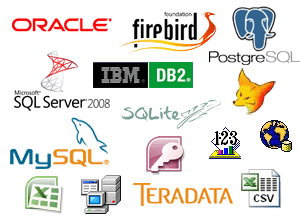
Database Management Systems
Database Management Systems are concerned with reading, writing and locating data efficiently. A database management system provides facilities for controlling data access, enforcing data integrity, managing concurrence, and restoring the database from backups. A database management system also provides the ability to logically present database information to users. In short, database management systems oversee the locating, accessing, outputting, and maintenance of data files. The converting, transferring, and verifying of data files is left up to the database administrator to perform.
The basic functionality of a Database Management System includes:
- The ability to query records. Querying is the process of requesting attribute information from various perspectives and combinations of factors. A structured query language (SQL) and report writer allow users to interactively query the database, analyze its data and update it according to the users privileges on data.
- Backup and replication. Copies of a database should be made regularly in case of primary disk or other equipment failure. A periodic copy of a database may also be created for company locations that cannot readily access the original.
- Rule enforcement. In order to ensure data integrity certain rules are applied to database tables so that the attributes are clean and reliable.
- Security. For security reasons, it is desirable to limit who can see or change specific tables in your database. This may be managed directly on an individual basis, or by the assignment of individuals and privileges to groups.
- Computation. Common computations requested on database tables include counting, summing, averaging, sorting, grouping and cross-referencing. Rather than have each database interface application implement these from scratch, they can rely on the database management system to provide such calculations.
- Auditing, change and access logging. Many database management systems provide the ability to keep a record of who accessed which tables, what was changed, and when it was changed.
- Automated optimization. For frequently occurring usage patterns or requests, some database management system can adjust themselves to improve the speed of those interactions. This can be accomplished by using stored procedures, cached results, and optimized data types and queries.
Database Management Systems include:
- SQL Server
- MS Access
- MySQL
- DB2
- Oracle
DATABASE
database